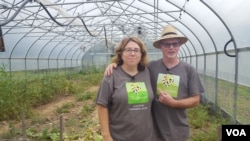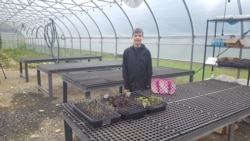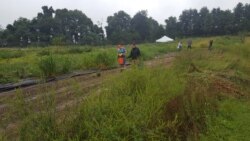Thirteen-year-old Jack is always busy. In addition to his schoolwork and other activities, he works on a farm three days a week.
"It's a lot of fun. I always have fun, transplanting and sowing the seeds," he said.
Jack is one of several employees working on A Farm Less Ordinary in Bluemont, Virginia. Greg Masucci and his wife, Maya Wechsler, founded the farm in 2015 to teach farming skills to people with intellectual and developmental disabilities like Jack, and help them earn money.
"We also grow organic vegetables along the way," Wechsler said. "Throughout that, we teach our growers basic employment skills."
Teaching confidence
Farm manager Heather Richardson works closely with the employees, showing each of them how to do assigned tasks step-by-step and helping them gain confidence.
"I really try to stick with it until they fully understand," Richardson said. "Then, I slowly back off. And my goal is to get to the point, like, saying, 'Hey, so and so, can you please go and transplant?' They know how to get their trays and what tools to use, but we just have to get the job done. Like today, we had to sow the seeds, though it's raining, but we had to do it."
Based on each grower's particular abilities and interests, employees are planting, weeding, mowing, harvesting and looking after the chicken coop.
"I'm a big fan of chicken," Jack said. "I clean the coop and get the eggs and get the clean water. And I have a lot of friends here."
Jack's mother, Tina Jenkins, says her son is excited about farm work and takes his job seriously.
"The other day, he was trying to get out of the car before the car stopped. He's like, 'Goodbye, Mom. I'm out.' He really loves to be here. He loves to get his hands dirty. He loves to be involved. With that comes success. When he plants something and sees it growing, he's very proud of himself, even if it's something that's beside what he's growing, he's claiming that it's his."
A space for Max
A Farm Less Ordinary is a success story for Wechsler and Masucci, who had no farming experience. In 2015, they purchased the farm and spent a year learning about farming — reading books, watching videos, taking courses in farming and financing, and experimenting.
Their son, Max, was the inspiration for founding the nonprofit. The couple hoped the farm could help people like Max and families like theirs.
"Max is our son who is severely autistic," Wechsler said. "He is 11 years old, turning 12 in November. He is a high-energy boy. He is nonverbal for the most part. Being out here also gives him an opportunity to burn off some of his energy in a way we could not give him when we lived in the middle of Washington, D.C. So, he gets to run around, go for walks in the woods, swing in his hammock outside at sunset, jump on his trampoline and scream and not bother anybody."
Masucci added, "The people with intellectual and developmental disabilities are having over 80% of unemployment rate. We are trying to change that. When people are not in the employment picture, they end up being socially isolated, and it puts a financial burden on families."
Planting skills, growing hope
This year, the farm has employed 17 growers. Richardson believes the farming process has a positive impact on her employees.
"It's a lot of small tasks that you need to do with your hands, which a lot of people might not have the hand-eye coordination or something like that," she explained. "It's also a lot of fine motor skills. You can learn that the world may be set up this way, but I can make accommodations for myself. I can go outside of the box and create a tool that can help me get the job done, no matter what."
A Farm Less Ordinary is not the final destination for many of these young people.
"We want to be a stepping stone," Masucci said. "It feels very good when we hear about employees who have gone on to get jobs. We're thrilled, because we feel like we have a little bit to do with their success story."
Masucci and Wechsler plan to expand and make finished products such as jams and pickles. That, they say, will give their employees more opportunities to work year-round and gain multiple learning experiences and skills.







